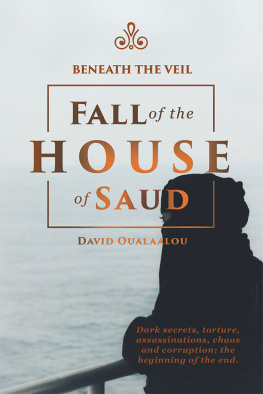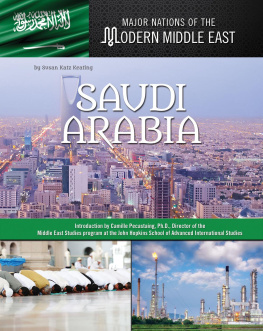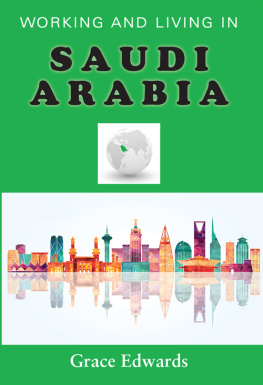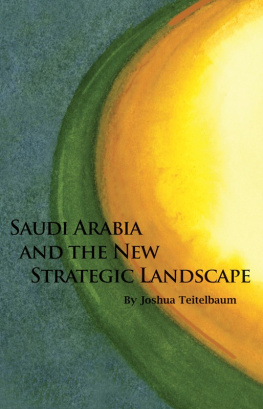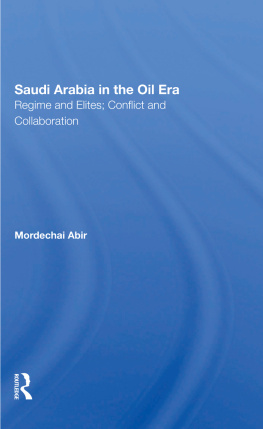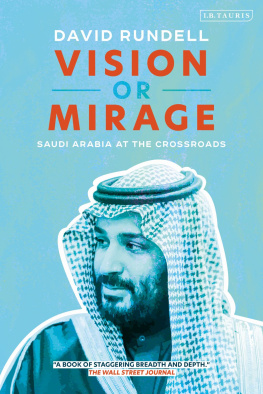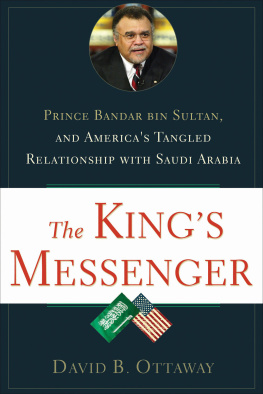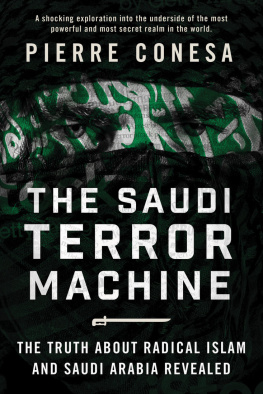BENEATH THE VEIL
Fall of the House of Saud
David Oualaalou

AuthorHouse
1663 Liberty Drive
Bloomington, IN 47403
www.authorhouse.com
Phone: 1 (800) 839-8640
Copyright 2018 David Oualaalou. All rights reserved.
No part of this book may be reproduced, stored in a retrieval system, or transmitted by any means without the written permission of the author.
Published by AuthorHouse 12/07/2018
ISBN: 978-1-5462-5852-0 (sc)
ISBN: 978-1-5462-5850-6 (hc)
ISBN: 978-1-5462-5851-3 (e)
Library of Congress Control Number: 2018910795
Cover Design and Photograph of the Author by Elizabeth Ann
Any people depicted in stock imagery provided by Getty Images are models,
and such images are being used for illustrative purposes only.
Certain stock imagery Getty Images.
Because of the dynamic nature of the Internet, any web addresses or links contained in this book may have changed since publication and may no longer be valid. The views expressed in this work are solely those of the author and do not necessarily reflect the views of the publisher, and the publisher hereby disclaims any responsibility for them.
Contents
In honor of those who, despite overwhelming odds, remain dedicated to their cause and speak truth to p ower
Just for a moment consider the following scenario in the kingdom of Saudi Arabia: a plot to assassinate the new king; a twist into a saga of a monarchy in chaos, the revelations of dark secrets, the love of money, the drama, the corruption, and the royal characters. The outcome could be a blockbuster movie of the year. Few years ago, this storyline would have been dismissed as too far-fetched. But today it is not fiction. Rather it is reality through which darks secrets are emerging. Disappearance of princes in the night intensifies. Rendition flights intrigue, detention and torture of royal members, including one of the worlds richest men, in the luxurious Ritz-Carlton hotel persist, deals with loyalists behind closed doors persevere, and corruption at the highest level runs amok. The emergence of these dark secrets reveals a sinister reality, that of a kingdom in a downward spiral. A reality that demands the attention of diplomats, global affairs analysts, intelligence officers, investors, the Chinese, the Russians, the Muslim world, and those with a panache for the lavish lifestyle of Middle Eastern royal ties.
Nearing his death, a venerable king, Salman bin Abdulaziz Al Saud, names one of his sons, Mohammed bin Salman (MbS), as heir to the kingdom. The young son prematurely takes the reins of power. Nave about international affairs, he immediately falls into various ill-conceived foreign-policy intrigues, including supporting armed factions in rival countries. The crown prince fears for his future at home, too, so he silences activists and would-be rivals within his country. Only months later, witnesses near the palace report the sound of gunshots, and observers speak openly of an assassination attempt on the crown prince. International reports speculate that he is dead; his subsequent appearances are shrouded in sec recy.
The idea of writing Beneath the Veil: Fall of the House of Saud became pressing to me after completing my second book, Volatile State: Iran in the Nuclear Age . While researching for new perspectives and untested theories, I came across a plethora of sources on the future of the Middle Easts geopolitical landscape in the aftermath of the current civil war in Syria. The devastation and instability in Iraq, the expansion of Islamic State in Iraq and Syria (ISIS) throughout the Middle East and North Africa (MENA) region and beyond, Turkeys and Irans flexing their military and political muscles, and the escalating tensions between Saudi Arabia and Iran are examples. Analysis points to Saudi Arabia as one of two key regional playersthe second is Iranin the unfolding drama of the Middle East.
Before continuing, I will offer my qualifications to the reader, specifically, my preparation for assessing the geopolitics of the Kingdom of Saudi Arabia. For more than ten years, I worked with elite US military forces carrying out operations by order of US policymakers. I visited Saudi Arabia, lived there, and worked there, officially representing the United States government, on many occasions. I speak Arabic fluently, grasp the depth of the kingdoms social, cultural, and religious interactions, and, from both abstract and practical perspectives, know how Saudi Arabias internal politics work. This firsthand experience is necessary, in my opinion, to offer the most salient analysis of how the desert kingdom interacts, responds, and manages its role within the current geopolitical landscape of the Middle East and the Muslim world writ large. Regarding my personal experience, please bear in mind that, though this work discusses unclassified and declassified information, it does not, and cannot , offer evidence from classified sou rces.
That said, I draw on those experiences to help both individual readers and broader audiences understand the political realities of the Middle East. I seek to share insights on how to solve the problems affecting both the Middle East and the world. My frequent writings have already contributed to understanding these important concerns. I have authored op-ed. pieces on global affairs for the Slovak Atlantic Council, an affiliate of the European Atlantic Council; the HuffPost ; the Waco Tribune-Herald ; South China Morning Post (Hong Kong), and the World Affairs Council (Austin, Texas). My articles have been translated into Arabic, Chinese, Farsi, French, German, Malay, Russian, Thai, Turkish, and Spanish, among other languages. Those articles address a wide range of topics that include global energy markets, international security, global affairs, US foreign policy, international business, and more. Occasionally, I describe how the geopolitical landscape in the Middle East may look in the next decade or so and how certain countries, including Saudi Arabia, may act or react given the seismic shifts shaping the political landscape, regionally and globally. I am also the author of two books, The Ambiguous Foreign Policy of the United States: More than a Handshake (2016) and Volatile State: Iran in the Nuclear Age ( 2018).
Like the previous two books, this book is not an editorial; it informs not only people who keep up with current events but also students of foreign policy, specifically, those considering a career in international affairs. It also informs industry leaders, helping them both to understand the impact of global politics on markets and economic trends and to make sense of the complex mix of geopolitical risks and economic opportunities. My analysis also draws from the writings of top scholars on the history, culture, and politics of Saudi Arabia and, more broadly, of international relations, and from leading scholarship on the Middle East. The research here is from academic journals, books, and other scholarly writings. It should appeal therefore to academics, foreign-policy professionals, international affairs analysts, policymakers, and the military establishment. This book also benefits business leaders in the energy sector, financial institutions, business associations, and investors. It provides them with analysis of geopolitical trends and the political, economic, and security risks that organizations face when working in the region. From a business perspective, my insights are key to an organizations long-term strategic planning and access to new markets not only in Saudi Arabia, but also in the Middle East.
I want the international business community in particular to question the assumption that Saudi Arabias oil will continue to give it a powerful voice in the international community. Conventional wisdom suggests that, given its oil wealth, Saudi Arabia always will be in a position to (a) influence regional politics and (b) impact global oil market prices. That assumption held true in the 1980s and 1990s. However, subsequent regional political and economic realities suggest otherwise. Given all the chaos in the region and Saudi Arabias role in fomenting that chaos, one must see that Saudi Arabias role will become even blurrier and more irrelevant. Even Saudi Arabia realizes that it lacks the political influence to affect events in the Middle East as they o ccur.
Next page
